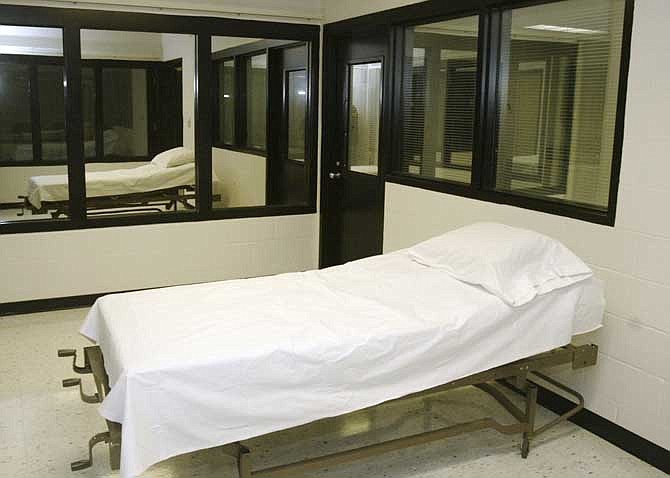New legislation could give the Missouri Department of Corrections the authority to choose any method it deemed appropriate to carry out executions - not just administration of lethal gas or chemicals.
Filed Wednesday by state Sen. Kurt Schaefer, R-Columbia, the proposal comes after months of consternation over how the department has been carrying out the past few executions and a week before the next one is scheduled.
Audio clip
School Boy Humor song Camera Shy from their new CD
A raft of other death penalty legislation has been filed in both chambers, ranging from appointing a commission to study the process and develop a new protocol to repealing the death penalty outright or even instituting the firing squad as an option of the corrections department.
On Monday, the Oklahoma compounding pharmacy that had been supplying the department with pentobarbital agreed to not supply it for next week's execution.
The department has provided for a backup method, which would rely on a lethal combination of midazolam and hydromorphone, according to court documents, but neither the department nor the governor have indicated what method will be used next week.
Gov. Jay Nixon insists the state is prepared to move forward with next week's execution, but declined to say Wednesday if the department was planning to use pentobarbital or another drug or combination of drugs.
"We are prepared for the execution next week," Nixon said Wednesday. He said the department handles the specifics of what lethal drugs to use for executions. "We have an execution protocol that is being followed by the department, and they have indicated that we are prepared to move forward."
Michael Taylor, who is scheduled to be executed next week for the rape and murder of a 15-year-old girl in the Kansas City-area, filed a motion for a stay in federal court. The legal filing argues that any pentobarbital the state has is expired and the protocol does not allow for another combination of drugs to be used. Moreover, it argues that if the state was planning to use the midazoloam combination, it would cause unconstitutional pain and suffering.
A deposition of a corrections employee in the court documents indicates that the state is in possession of the midazolam and hydromorphone combination. Ohio used the method in an execution last month that took more than 25 minutes, and Ohio and Louisiana have both halted executions for the next few months until the method can be studied further.
Schaefer's bill would eliminate the language in Missouri's death penalty statutes that specifically spells out the use of lethal gas or lethal injection as the two methods available for executions and replace it with any method "determined by the department of corrections."
The department would be bound by existing state and federal case law that governs what methods of execution are appropriate, he said. If the department chose a method that required additional funding or resources, he would be willing to work with them to fill those needs.
He said opponents of the death penalty were attempting to put a stop to it by "interfering in the process of how the drug is acquired... without a public debate and transparent conversation about the death penalty."
"They are basically using the difficulty of getting ahold of an execution drug, or the media and political pressure on the manufacturer of that drug, to basically do an end-around to change public policy," Schaefer said.
Schaefer said he cut his teeth in the attorney general's office prosecuting death penalty cases, and he hopes to take that expertise into the 2016 attorney general's race, which he has already announced his candidacy for.
"Executing someone under the power of the state should never be just an administrative determination or anything that's easy, it should be a hard decision and it shouldn't be comfortable for anyone," he said.
Lethal injections, lethal gas, electrocutions, hanging and firing squads are allowed under U.S. law, according to the Death Penalty Information Center, and would be available options to the corrections department under Schaefer's bill.
Richard Dieter, executive director of the Death Penalty Information Center, said that Arkansas passed a similar measure to what Schaefer has proposed, but it was shot down by the Arkansas courts.
"The problem with such a law is that it delegates important decision making away from the legislature and to an unelected, unresponsive administrative function," Dieter said. "If too much gets delegated to administrative agencies, its like the agencies are making the laws and not the people."
He also said the secrecy surrounding the department's procurement of lethal drugs has caused the media and political firestorm that has ensued for the past months.
"Controversy around each execution is not new," he said. "It grows the more the state hides the ball, the more the state uses secrecy the more they invite inspection. ... When you say I have a secret, everyone wants to know."
For his part, Schaefer thinks the department is as transparent as it needs to be. "The process itself is never going to be a secret, and it shouldn't be," he said.

